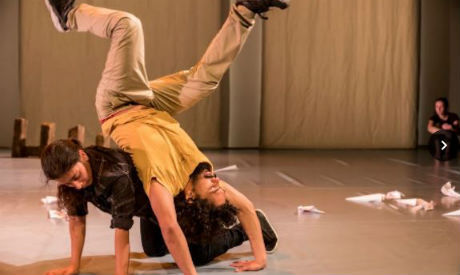
Kite Without String from the Netherlands (Photo: courtesy of AFCA)
On Thursday, around a hundred people, children and parents, gathered in the main lobby of the Hanager Arts Centre in Zamalek, anxiously awaiting the start of this year’s Hakawy International Arts Festival for Children.
The waiting audience was treated first to a silent, but engaging, performance by a Dutch modern dance troupe, their movements drawing in young ones and adults alike. It took the audience a while to realise that this was a performance, but what followed was enthusiastic participation.
A good portion of the audience were young ones with Down’s syndrome, and their laughter and participation were contagious to the rest. The performance was movement only, no music, but the smiling dancers managed nonetheless to engage enthusiastic young audience members into joining in.
After the exciting performance came the story-telling. Festival director Ahmed El Ghawy and his colleagues told their rapt audience a story that answered the question: why is the sea salty? Many of the adults themselves didn’t know the answer.
The story goes that a rich, just king once had a magic mill that made his wishes come true. One day, a thief disguised himself as one of the palace guards and sneaked into the king’s bedroom, finding the mill and clapping his hands three times to make it obey his commands.
The narrative goes that a rich, just king had a magic mill that allowed him to get any wish he desired. No one knew where it was or how it worked. Until one day a thief was able to disguise as one of the guards and went into the palace and realised it was in the king’s bedroom and it functions by clapping the hand three times in a row.
The thief returned later and stole the magic mill. When he ate and drank he discovered that his food lacked salt. He clapped his hands asking for salt. True enough the mill started producing salt. He ate and then fell asleep, yet the mill kept producing salt. The thief had not learned how to make the mill stop. In a panic, he threw the mill into the sea, and it ended up in the bottom of the sea. The legend continues that the mill is, even now, still producing salt.
The story-tellers then sang “Why is the sea laughing?” to the music by El-Sheikh Emam, and the audience, in high spirits, sang along.
The festival’s founder and artistic director Mohamed El-Ghawy said that one of the team had told the same story in an event at a school. One of the children in the audience had fallen asleep, and when he had finished his tale, the story-teller apologised to the teacher for not being able to engage the child in question.
The teacher responded that the child had been unable to sleep for three weeks due to constant nightmares, and that his falling asleep in class must have meant that he felt safe and secure.
Feeling safe and secure is the ultimate goal for everyone, and that is one of the important messages of the festival.
Although in theory meant for children, the adults present were also enraptured by the skill of the story-tellers, and shrugged off their status as grownups to engage happily in the activities.
The 8th Hakawy International Arts Festival continues until 13 March (check the full programme here) and there will be many more opportunities for adults and children alike to discover the power of the arts.
Ahram Online and Al-Ahram Weekly are media sponsors of this year's festival.
For more arts and culture news and updates, follow Ahram Online Arts and Culture on Twitter at @AhramOnlineArts and on Facebook at Ahram Online: Arts & Culture
Short link: